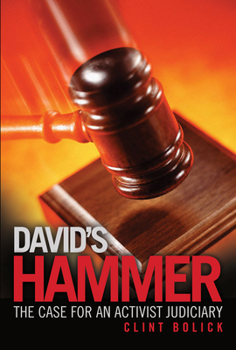David's Hammer: The Case for an Activist Judiciary
Select Format
Select Condition 
Book Overview
Judicial activism is condemned by both right and left, for good reason--lawless courts are a threat to republican government. But challenging conventional wisdom, constitutional litigator Clint Bolick argues in David's Hammer: The Case for an Activist Judiciary that far worse is a judiciary that allows the other branches of government to run roughshod over precious liberties. For better or worse, only a vigorous judiciary can enforce the limits on executive and legislative action, protect constitution-al rights, and tame unelected bureaucrats. David's Hammer reclaims for the judiciary its intended role as the ultimate safeguard of a free society.
Format:Paperback
Language:English
ISBN:1933995025
ISBN13:9781933995021
Release Date:April 2007
Publisher:Cato Institute
Length:165 Pages
Weight:0.85 lbs.
Dimensions:0.5" x 5.9" x 8.9"
Customer Reviews
2 ratings
A Good Read
Published by Thriftbooks.com User , 16 years ago
Bolick wrote in a styled manner that made this selection a quick read. The framework laid out in the first few chapters is very interesting. In these chapters Bolick discusses what judical activism is, then moves on to show how the framers, Madison and Hamliton, in the Federalist papers supported judical activism. In the next section of the book Bolick discusses the good of activism and the bad of in-activism. Bolick then provides many examples within the sector of economic rights, school choice and property rights. I only wish Bolick would have spent more time on social issues.
Too Little Judicial Activism?
Published by Thriftbooks.com User , 18 years ago
I read this book after seeing a presentation by the author on C-SPAN which he made at the Cato Institute here in Washington, which also published the book. Cato is of course a well-respected libertarian think tank which publishes a lot of material and hosts speaker presentations on the general themes of government encroachment, individual freedom of action, and limited government. The author, a well credentialed lawyer involved with several public-service law firms and institutes, puts forward quite a bold thesis for these days: we need more, not less, judicial activism. He suggests that too often courts sit by while individual freedom is circumscribed by government. I had not really had much experience with the libertarian approach, and found his discussion to be quite interesting in that regard. A good introduction is offered through a discussion of the author's Swedenburg Supreme Court case, which ended state efforts to foreclose out-of-state wineries from shipping their product into the state. Next, the author looks at "activism" from both the conservative and liberal lperspectives. Along the way, the author takes some shots at Justice Breyer, Professor Sunstein, and the "Chevron doctrine" which encourages courts to defer to administrative agencies when interpreting their formative statutes. The author also discusses theories of constitutional interpretation, and argues that courts are more democratic than we think. A particularly interesting chapter deals with instances of bad activism (e.g. Plessy and Caroline Products), and the Warren Court is critically examined ("pick and choose" jurisprudence). The book becomes particularly interesting when the author discusses the Rehnquist Court and his favorite justice of all time--Clarence Thomas (for whom he worked at the EEOC and supported during his nomination battle). The final chapters deal with favorite libertarian topics: economic liberty; private property rights; school choice. Finally, the author concludes with kudos for state constitutions and state courts, as demonstrating significant potential to deliver good activism for the right reason. While the author's evaluation of cases and doctrines is highly subjective, nonetheless the book is a stimulating introduction to the libertarian philosophy and offers a unique slant on the whole issue of what judges should be doing, activist or not. The fact that the author was himself involved in many of these cases adds a rich additional perspective. An excellent selection of notes is attached. At around 160 pages the book moves along nicely and holds the reader's interest.






